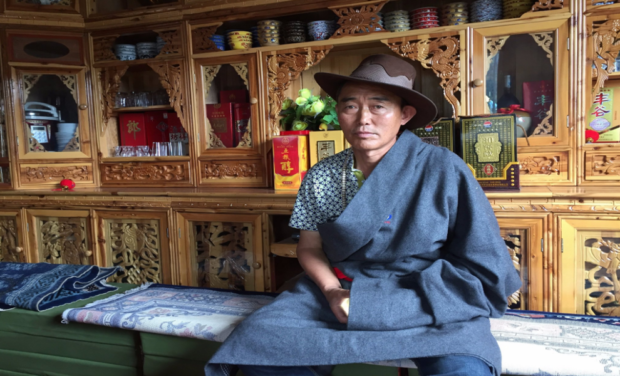Millions of Tibetan nomads move into permanent homes
By
Updated 13 Sep 2016 17:20
Several nomadic herders have heaped praise on the resettlement project, but experts deduce it is actually a product of the government’s desire for greater control over the large grassland population and could lead to social problems.
BEIJING: For decades, 56-year-old Zezu has herded yaks across grasslands in China’s southwestern Sichuan province.
In 2011, he and his family moved into a permanent home in the Aba prefecture under a government scheme to urbanise nomadic herders. He now splits his time between his house in Muchang village and his family’s grazing grounds that is kilometres away.
Zezu, a Tibetan nomad whose family now has a permanent home in the Aba prefecture in China’s Sichuan province. (Photo: Jeremy Koh)
In an interview conducted in the presence of government minders, Zezu said: “In the past, our living conditions weren’t good. Then the country built this resettlement village for us and it’s a lot better, especially for old people. My mother is 80-something years old. She said she’s very happy to stay here, where she doesn’t have to live among the yaks.”
Zezu is just one of millions of Tibetan nomads who have been resettled into permanent homes. Other nomads Channel NewsAsia spoke to also heaped praise on the resettlement project.
Keke, a Tibetan nomad, said: “The life of a nomad is very tough. We have to worry every season for the grass, yaks and for the prices of livestock. It’s also very labour intensive. Being a nomad is very tiring, so I hope my children can live in cities and rely on their brains to earn money.”

The Muchang village where Zezu and his family now live. (Photo: Jeremy Koh)
The government said resettlement gives herders access to health care and schooling, while offering them new job opportunities.
“As nomads, their interactions with other people are limited and if they get sick, they can’t get timely medical care. Children also have to walk very far to school and it’s not beneficial for their growth,” said Feng Yu, Deputy Secretary-General of the Aba People’s Government.
He added: “With this resettlement project, old people and children can stay behind while the able-bodied can head out to find work or be herders without worries. I would say that the people highly agree with and support this project.”

The Aba prefecture may be outside the Tibet Autonomous Region, but it is part of what Tibetans consider their heartlands. (Photo: Jeremy Koh)
Critics, however, said the relocation efforts often have another goal that is largely absent from official policy pronouncements – greater government control over what is seen as a restive population.
Kate Saunders, Communications Director for the International Campaign for Tibet said: “At least part of the Chinese authorities’ intent behind these policies is to administer control more effectively. Settling people obviously makes it much easier to administer control over a large population in the grasslands.”
Other experts have warned that Beijing’s attempts to settle traditionally nomadic Tibetans could destroy an ancient culture and lead to social problems.

The vast majority of Tibetans practice Tibetan Buddhism. (Photo: Jeremy Koh)
Robert Barnett, Tibetan expert at Columbia University said: “The government said they’ve settled at least a million of the nomadic Tibetans in Sichuan part of Tibet. It’s a major shift in their way of life and we’re not quite sure how those resettled Tibetans are going to earn a living.
“They get cash of course for the first few years. They get a handout, which might last three years or something like that, but it’s not quite clear how many of them will be able to transition to becoming truck drivers or shop keepers.”
However, Beijing has swept aside these criticisms. Official news accounts of the resettlement programme are backed by upbeat testimonies similar to those offered by nomads Channel NewsAsia spoke to.
– CNA/hs



comment 0